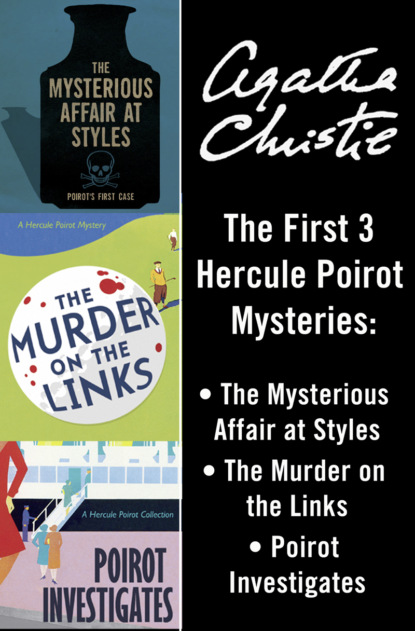По всем вопросам обращайтесь на: info@litportal.ru
(©) 2003-2025.
✖
Hercule Poirot 3-Book Collection 1: The Mysterious Affair at Styles, The Murder on the Links, Poirot Investigates
Автор
Год написания книги
2018
Настройки чтения
Размер шрифта
Высота строк
Поля
‘Pardon me, madame, for recalling unpleasant memories, but I have a little idea’—Poirot’s ‘little ideas’ were becoming a perfect byword—‘and would like to ask one or two questions.’
‘Of me? Certainly.’
‘You are too aimable, madame. What I want to ask is this: the door leading into Mrs Inglethorp’s room from that of Mademoiselle Cynthia, it was bolted, you say?’
‘Certainly it was bolted,’ replied Mary Cavendish, rather surprised. ‘I said so at the inquest.’
‘Bolted?’
‘Yes.’ She looked perplexed.
‘I mean,’ explained Poirot, ‘you are sure it was bolted, and not merely locked?’
‘Oh, I see what you mean. No, I don’t know. I said bolted, meaning that it was fastened, and I could not open it, but I believe all the doors were found bolted on the inside.’
‘Still, as far as you are concerned, the door might equally well have been locked?’
‘Oh, yes.’
‘You yourself did not happen to notice, madame, when you entered Mrs Inglethorp’s room, whether that door was bolted or not?’
‘I—I believe it was.’
‘But you did not see it?’
‘No. I—never looked.’
‘But I did,’ interrupted Lawrence suddenly. ‘I happened to notice that it was bolted.’
‘Ah, that settles it.’ And Poirot looked crestfallen.
I could not help rejoicing that, for once, one of his ‘little ideas’ had come to naught.
After lunch Poirot begged me to accompany him home. I consented rather stiffly.
‘You are annoyed, is it not so?’ he asked anxiously, as we walked through the park.
‘Not at all,’ I said coldly.
‘That is well. That lifts a great load from my mind.’
This was not quite what I had intended. I had hoped that he would have observed the stiffness of my manner. Still, the fervour of his words went towards the appeasing of my just displeasure. I thawed.
‘I gave Lawrence your message,’ I said.
‘And what did he say? He was entirely puzzled?’
‘Yes. I am quite sure he had no idea of what you meant.’
I had expected Poirot to be disappointed; but, to my surprise, he replied that that was as he had thought, and that he was very glad. My pride forbade me to ask any questions.
Poirot switched off on another tack.
‘Mademoiselle Cynthia was not at lunch today? How was that?’
‘She is at the hospital again. She resumed work today.’
‘Ah, she is an industrious little demoiselle. And pretty too. She is like pictures I have seen in Italy. I would rather like to see that dispensary of hers. Do you think she would show it to me?’
‘I am sure she would be delighted. It’s an interesting little place.’
‘Does she go there every day?’
‘She has all Wednesdays off, and comes back to lunch on Saturdays. Those are her only times off.’
‘I will remember. Women are doing great work nowadays, and Mademoiselle Cynthia is clever—oh, yes, she has brains, that little one.’
‘Yes. I believe she has passed quite a stiff exam.’
‘Without doubt. After all, it is very responsible work. I suppose they have very strong poisons there?’
‘Yes, she showed them to us. They are kept locked up in a little cupboard. I believe they have to be very careful. They always take out the key before leaving the room.’
‘Indeed. It is near the window, this cupboard?’
‘No, right the other side of the room. Why?’
Poirot shrugged his shoulders.
‘I wondered. That is all. Will you come in?’
We had reached the cottage.
‘No. I think I’ll be getting back. I shall go round the long way through the woods.’
The woods round Styles were very beautiful. After the walk across the open park, it was pleasant to saunter lazily through the cool glades. There was hardly a breath of wind, the very chirp of the birds was faint and subdued. I strolled on a little way, and finally flung myself down at the foot of a grand old beech-tree. My thoughts of mankind were kindly and charitable. I even forgave Poirot for his absurd secrecy. In fact, I was at peace with the world. Then I yawned.
I thought about the crime, and it struck me as being very unreal and far off.
I yawned again.
Probably, I thought, it really never happened. Of course, it was all a bad dream. The truth of the matter was that it was Lawrence who had murdered Alfred Inglethorp with a croquet mallet. But it was absurd of John to make such a fuss about it, and to go shouting out: ‘I tell you I won’t have it!’
I woke up with a start.
At once I realized that I was in a very awkward predicament. For, about twelve feet away from me, John and Mary Cavendish were standing facing each other, and they were evidently quarrelling. And, quite as evidently, they were unaware of my vicinity, for before I could move or speak John repeated the words which had aroused me from my dream.
‘I tell you, Mary, I won’t have it.’

















